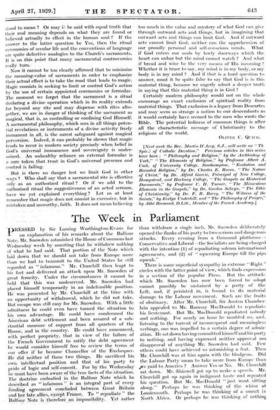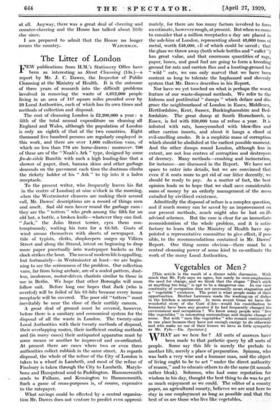The Week in Parliament P RESSED by Sir Lathing WOrthington-Evaris for
an explanation of his remarks about the Balfour Note, Mr. Snowden astonished the House of Commons last Wednesday week by asserting that . he withdrew nothing of what he had said. That portion of the Note Which laid doWn that. We should not take from Europe more than we had to transmit to the United States he still regarded as " infamous." Mr. Churchill then leapt to his feet and delivered an attack upon Mr. Snowden of great ferocity. Under the circumstances it cannot be held that this was undeserVed. Mr. Snowden had placed himself temporarily in an indefensible position. He was presented by Mr. Churchill at the time with an opportunity of withdrawal, which lie did not take. But escape was still easy for Mr. Snowden. With a little adroitness he could even have turned the situation to his own advantage. He could have condemned the liMerican debt settlement and been assured of a sub- stantial measure of support from all quarters of the House, and in the country. He could have announced, With perfect propriety, that in view of the failure of the French Government to ratify the debt. agreement he would consider himself free to review the terms of our offer. if he became Chancellor of the Exchequer. He did neither of. these two things. He sacrificed his own intellectual position and that of his party to pride of logic and self-conceit.. For by.the Wednesday he must haVe been aware of the true facts of the situation. The doctrine embodied in the Balfour NOte which he deieribed as " infainous.". is an integral part of every fUnding. agreement concluded between Great Britain and her late allies, except F'rance. To " repudiate " the balfoni Mite' is therefore an Yet rather than withdraw a single inch, Mr. Snowden deliberately opened the flanks of his party to two serious and dangerous attacks. Every evening from a thousand platforms— Conservative and Liberal—the Socialists are being charged with the intention (1) of repudiating solemn international agreements, and (2) of " squeezing Europe till the pips squeak."
There is some superficial sympathy in extreme "Right " circles with the latter point of view, which finds expression in a section of the popular Press. But the attitude which Mr. Snowden has now been forced to adopt cannot possibly be sustained by a party of the Left, and, if persisted in, is bound to do material damage to the Labour movement. Such are the fruits of obstinacy. After Mr. Churchill, Sir Austen Chamber. lain appealed. to Mr. Ramsay MacDonald to repudiate his lieutenant. But Mr. MacDonald repudiated nobody and nothing. For. nearly an hour he rambled on, and, listening to the torrent of inconsequent and meaningless verbiage, One was impelled to a certain degree of admir- ation. He sat down having committed himself and his party to nothing, and having expressed neither approval not disapproval of anything Mr. Snowden had said. Few others could have achieved so astonishing a feat. Then Mr. Churchill was at him again with the bludgeon. Did the Labour Party mean to take more from Europe than e paid to America ? Answer Yes or No. Mr. Churchill sat down. Mr. Shinwell got up to make a speech. Mr. Churchill got up again in indignant haste and repeated his question._ But Mr. MacDonald " just went sitting along." Perhaps he was thinking of the whim at Lossiemouth. Perhaps he was thinking of a sunset i n North Africa. Or perhaps he was thinking of nothing at all. Anyway, there was a great deal of • cheering and counter-cheering and the House has talked about little • else since.
I am . prepared to admit that the House ne • longer









































 Previous page
Previous page